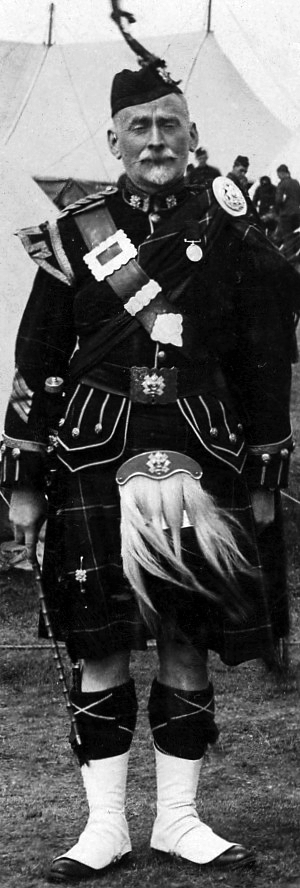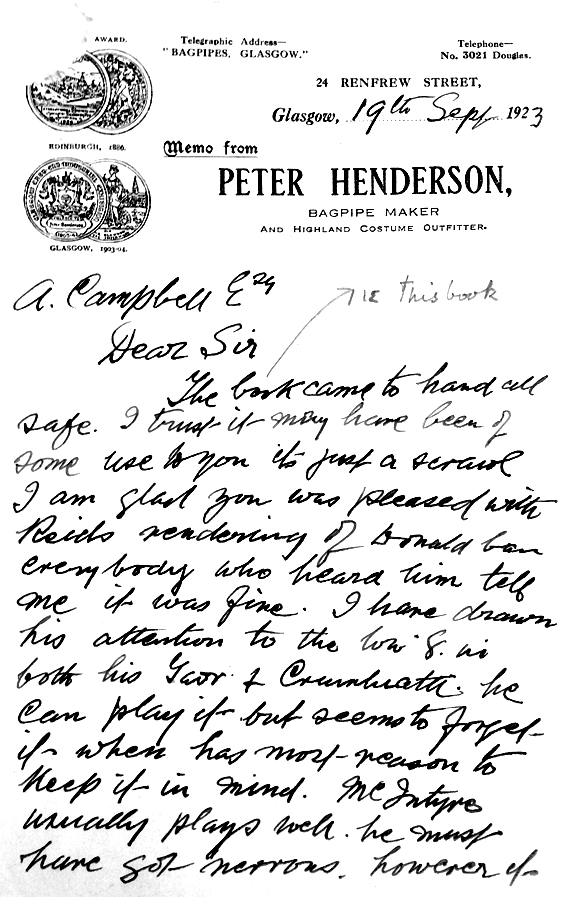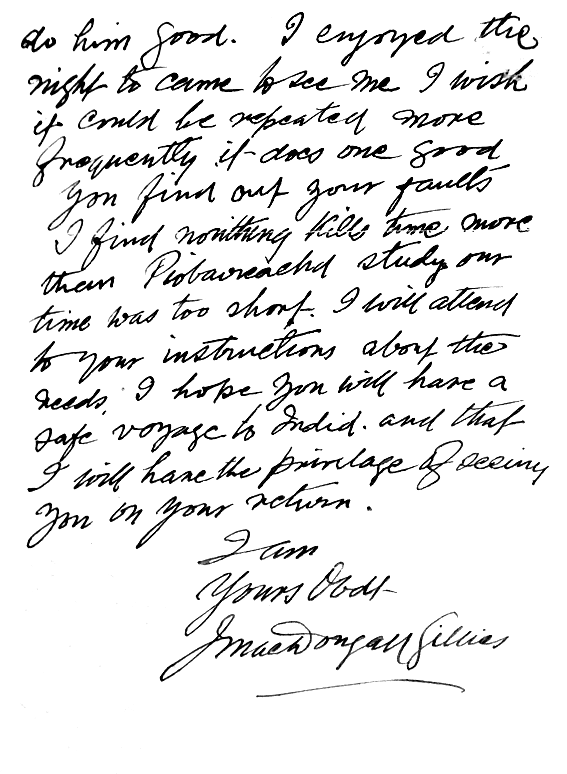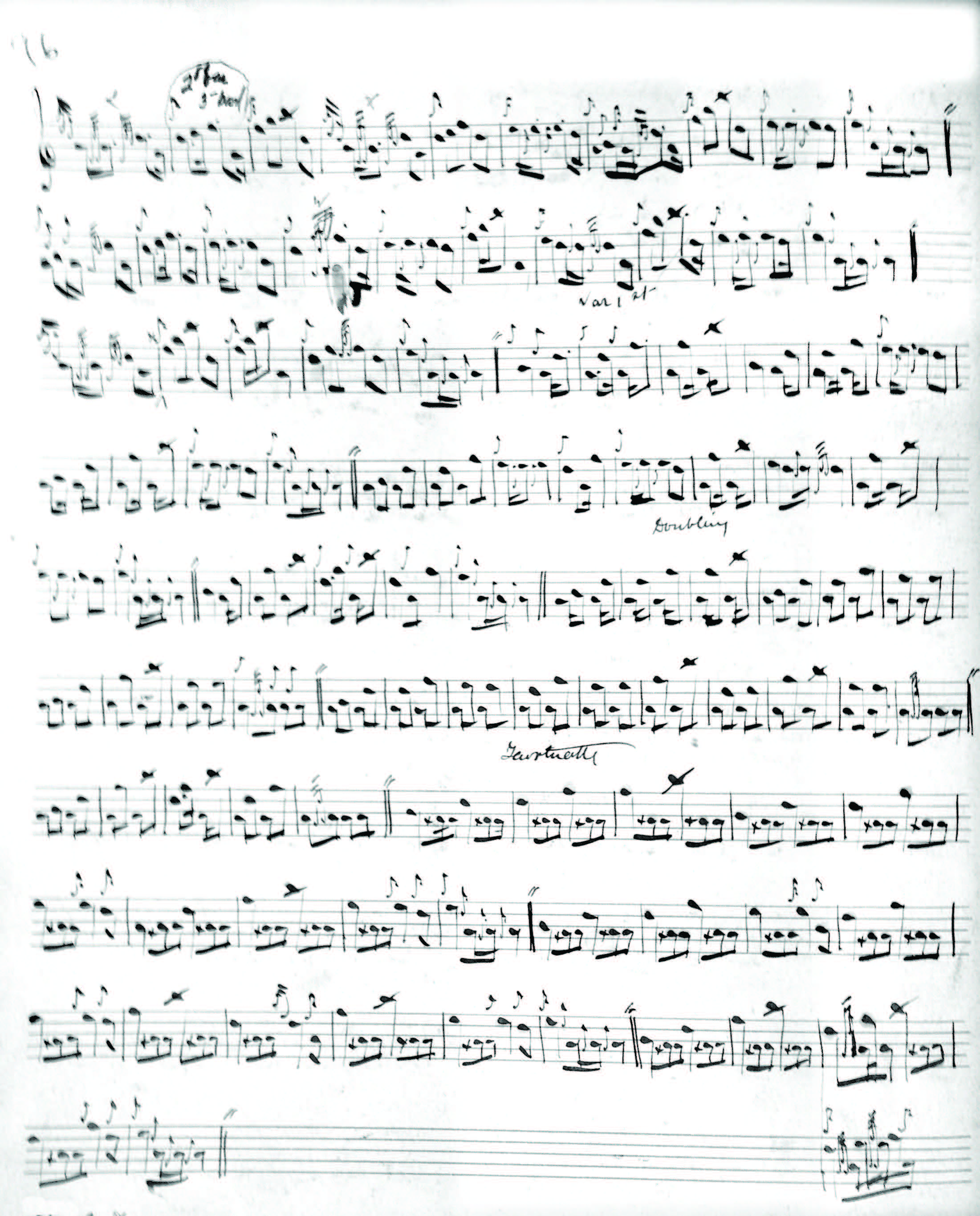
My last analysis of the John MacDougall Gillies Manuscript brought to prominence a Nameless tune ‘No 96’, and it is pleasing to see that the editors have chosen to include it in the new Book 16 in the Piobaireachd Society’s series.
However, tune 96, as reproduced in the book, is altered significantly from what appears in the MS. The editors have considered it a draft and set about manipulating into a shape they think better represents what the composer?/compiler intended. They are perfectly entitled so to do and stand or fall on the success or otherwise of their endeavours. Pipers might like to compare the two.
And PDF copy for printing: tune 96 MacDougall Gillies.
We’ll have more on Book 16 in the future, but for now I want to turn your attention to the MS in question. The John MacDougall Gillies manuscript is the property of Glasgow University Library (MS No.1457) and can be viewed on application. A trip to the library (opposite the main gate and up the hill) is well worthwhile, and staff are very accommodating and helpful. For those who can’t make the trip, a copy of the MS is on the Piobaireachd Society website.

It was written between 1879 and 1884 by MacDougall Gillies, a man credited with perpetuating the ‘Cameron’ style of piobaireachd playing, and who, through his teachers Sandy and Keith Cameron, can be viewed as part of the carrying stream of our piobaireachd tradition. The MS has a hard back cover and runs to 120 pages. Inside the front cover are two documents, the first a resumé of Gillies’s life and learning by James Campbell, Kilberry. Dated 1977, it reads:
‘John MacDougall Gillies (1854 – 1925) was a native of Cowal and was well known as one of the finest and most cultured pipers of his generation. He was acknowledged especially as a master of pibroch [sic]. He was a pupil of the Camerons – Sandy, Keith and Colin, whose father, the famous Donald Cameron, was taught by John MacKay, Raasay. He himself had many pupils, famous among whom were Pipe Major W. Gray and Pipe Major R. Reid. He was, for 22 years, manager of the bagpipe firm of Peter Henderson, Renfrew Street, Glasgow. At one time he was piper to the Marquis of Breadalbane at Taymouth Castle, and he was also piper to the Glasgow Highland Club for about 28 years. This manuscript, modestly described by him as ‘just a scrawl’, was made as an aide memoir, and does not seek to portray the actual playing style of the author.’
Far be it from me to dispute James's assertions re 'aide memoir', but I do think the book more than just that; and in writing what he did James was in some way going along with MacDougall Gillies's self-deprecating 'just a scrawl' comment made in the interesting letter we are about to examine. The book is too well done for it to be either a 'scrawl' or just an aide memoir.
The second document is a letter addressed to Archibald Campbell, Kilberry. It is dated 19/9/1923 and is on Peter Henderson notepaper. The letter is perfectly legible:

After acknowledging the book's safe arrival, Gillies comments on the playing of Lament for Donald Ban MacCrimmon by his protégé Robert Reid. I find the reference to the low '8s' in the taorluath and crunluath intriguing. By 'low 8s' does he mean low As, 'redundant 'low As'? And is he therefore criticising Reid for not playing them in a satisfactory manner? Certainly the MS has all T & C movements written with them in place. (See crunluath example bottom right in tune 96 above).
'He [Reid] can play it but seems to forget it when he has most reason to keep it in mind,' writes Gillies. When I was taught to play these movements by RG Hardie, Reid's pupil, he made the point that the crunluath should be practised with the 'redundant' low A but when performed should never interrupt the rhythm of the gracenotes - it should never intrude in the movement's flow. If it did, it was not being executed properly. The 'redundant A' was played in the taorluath too, but the same rules applied. And, said Hardie, you had to have skill to execute them properly, especially in the taorluath.
Reid did and was renowned for the brilliance of his crunluath movement in particular. Here is a recording of him playing both T & C with the 'redundant A' slowly and then quickly:
And now the great man in action on the great pipe with the crunluath doubling from I Gave a Kiss to the King's Hand:
• To be continued with a more detailed look at the MacDougall Gillies MS. To research the playing of Robert Reid join the Piobaireachd Society and search the archives.

















Check JMacDG’s “g” in the next line. jgg
Corrected; thank you. RW
Plus MacD Gillies says “in both his taorluath and crunluath” – again, suggests the red low A. unusual (never?) to find any double echoes in the taorlouath and crunluath variations…
If Gillies was talking of the tap on the double echo to D, why would he say “He can do it” – anyone can do it, it’s easy. The crunluath and the red low A is a much harder thing to do – much more fitting with “he can do it”… Plus that’s a funny way to write a G – it looks like a classic cursive 8.
Low 8 may well be Low A – as A is the 8th note down from High A. This, added to the fact that one doesn’t hear any redundant low A grace note when Reid plays at speed, suggests Reid was in the habit of leaving it out! This also adds credence to claims made by many that, despite his protestations to the contrary, Reid changed what he was taught by MacD Gillies. Nothing wrong with that – but Reid always said he didn’t. I know at least one MacD Gillies lineage pupil who says Reid changed a lot of the style MacD Gillies taught him.
Robert, alias, Rab,
I was also curious re the comment re low G and what came to mind is the method of playing D echo beats. Some of the old manuscripts and publications have the first beat of the D echoing beat as a C and not.a low G. I am aware of some of the old pipers playing the C instead of the low G and indeed I think it has a rather nice delicate touch to it instead of the low G which can sound like a heavy slap! I have used the C grace note instead of the low G and got the attention of a judge who likes to write crit sheets, who regarded the C as wrong as it was not heavy enough, but we cannot satisfy everybody, nor should we try! The tune I played was The End of the Great Bridge, in which there are a few of the D echoing beats.
A few years ago there was a chap who did the talk on the Cameron/Gillies style when delivering the College of Piping Lecture at Pitlochry and he made reference to this if my memory serves me. Bad manners of me, but the chap’s name deserts me at the moment. His father was taught by Gillies. Was it the son of William Barrie? In any case it was a good lecture and the guy made reference to this. He is/was a good player and knew what he was about.
For reasons of consistency in the playing of taorluath and crunluath and the undoubted fact that Robert Reid had excellent technique and apparently never or rarely missed such gracenote ornaments, I would find it hard to believe that in those movements, he would forget to play a single gracenote of the ornament. As taorluath and the crunluath are referred to, in all probability I am wrong in my assumption.
There is reference to somebody called MacIntyre. Who would that be?
The only name which comes to mind is Duncan MacIntyre and I don’t know anything about him other than what has appeared in the piping news media.
Duncan Watson
PS
(Now back to planting summer flowers.)
RG Hardie taught the D echo to C and abhorred the ‘slap’ to low G. From listening to Bob Brown’s recordings whilst doing the Masters of Piobaireachd CDs, we frequently heard him play it to C also – a surprise. I know that Hardie was friendly with Brown, a friendship which, apart from the piping, may have grown with Hardie’s visits to Laurencekirk, his mother’s home town, during the games season.
The illuminating talk you referred to was at the Piobaireachd Society Conference and was given by Jim Barrie. He impressed everyone who heard him. It will be in the Proceedings.
I think you are right about the MacIntyre being Duncan of that ilk. Will try find out something about him. Hope the flo’oers are blooming awa’.
Thanks for this, Rab. It would be quite a treat if you could also find and post any recordings Robert Hardie did of piobaireachd. I’ve never had the pleasure of hearing anything but his Muirhead recordings.
Will try to find something Steve. Cheers. RW